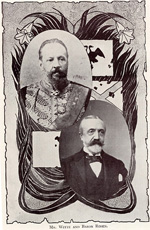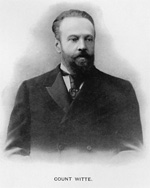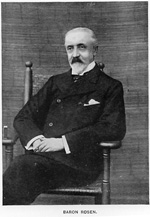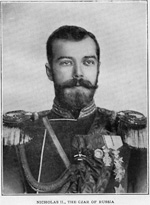 PEOPLE
PEOPLE

People, Part Three:
Russia
Witte
The Tsar’s first two choices as First Plenipotentiary for the conference declined the appointments, claiming illness. Russia’s military defeat embarrassed the monarchy and jeopardized its future, and many people felt the delegates would become scapegoats for the defeat. The Tsar at last turned to Sergius Witte, ironically the man who had worked diligently to forge an agreement with Japan over spheres of influence in Manchuria and Korea that could have prevented the war. The other plenipotentiary selected was Baron Roman Rosen.
Educated as an engineer, Witte went into railroading and rose to the director of the department of railway affairs in the finance ministry. Impressed with Witte’s skills Tsar Alexander II appointed him Russia’s finance minister in 1892. During Witte’s tenure Russia achieved unprecedented economic growth.
When Nicholas became tsar in 1894 he continued to work with the extremelly accomplished Witte. Over time Nicholas found Witte arrogant and disliked Witte’s rising power and authority so in August 1903 Nicholas promoted Witte to chairman of the committee of ministers, a position of relatively little importance. When others declined to accept the position as the chief envoy to the peace conference, Nicholas reluctantly appointed Witte.
In describing the tall Russian, Dillon wrote, “Into Witte’s judgment emotion enters as readily as sap into leafage. He is no mere theorizer, but a daring experimentalist, who sometimes pays a high price for the knowledge he acquires at the school of experience. He breaks through mere distractions as a bird through a web. Hence in a debate he never contents himself with hurtling one argument against another. It is his aim—an aim in which he is not always successful—to put himself in the place of his opponent, to show how the hostile argument first originated and what the conditions are that vitiated at its source. But however ruthlessly he may crush an opinion, he is never pitiless to an enemy. For with acumen and resourcefulness he combines genuine kindness and can descry in bad deeds good, or at any rate, an indifferent motive.”
Rosen
The Russian ambassador to the United States, Baron Roman Rosen was also a former ambassador to Japan, and had attempted to prevent the conflict.
Tsar Nicholas
Tsar Nicholas, the good natured, but enigmatic leader of Russia, was a puzzle to most who knew him. He ruled by his belief in divine right and was determined to preserve his autocracy, a position that cost his own life and that of his family in 1918. When Nicholas reached his 22nd birthday, his parents decided it was time for their son to see the world. He embarked on a grand tour that included stops in the major capitals of Europe and then on to the Orient. The voyage was abruptly cut short in Otsu (near Kyoto), Japan. While Nicholas was riding in a rickshaw, a crazed Japanese constable wielding a sword attacked the young visitor on the head. Some historians believe Nicholas, who forever bore a scar of reminder, held an unfriendly opinion of the Japanese as a consequence. But Nicholas later dismissed the assassination attempt as “the work of a fanatic.” The incident did not diminish his interest in the Orient and what he later came to believe Russia’s “Holy Mission” to expand its influence into the Pacific region. Despite the war losses, Nicholas was concerned with maintaining Russia’s dignity as a great power, even at the risk of continuing the war. He had to be convinced by his advisors that a peaceful settlement was in his, and Russia’s, best interests.




